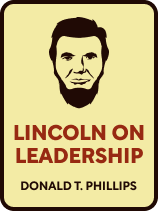

This article is an excerpt from the Shortform book guide to "Lincoln on Leadership" by Donald T. Phillips. Shortform has the world's best summaries and analyses of books you should be reading.
Like this article? Sign up for a free trial here.
What was Abraham Lincoln’s leadership style like? What lessons can modern-day leaders draw from Lincoln’s presidency?
Throughout his presidential career, Abraham Lincoln practiced an open-door policy, always being accessible, even to his lowest-rank subordinates. Thanks to this approach, Lincoln inspired trust and commanded respect, making him the exemplary leader he is known as today.
Below, we’ll explore how Lincoln’s open leadership style benefited him in his presidential career and how you can adopt Lincoln’s methods for yourself and your organization.
Abraham Lincoln: “Man of the People”
Phillips argues that leaders should be open, accessible, and friendly to the people around them. This includes being around if people want to talk to you, as well as having a friendly and welcoming demeanor. By making yourself easy to approach and listening to your employees, you’ll gain their trust and respect—they’ll see that you care about their opinions and are committed to working alongside them. In addition, by talking to people on every level of your organization, you can gain valuable information about how things work and how you could improve them. This information can then help you make well-informed decisions later on.
Phillips writes that Abraham Lincoln’s leadership style exemplified these principles throughout his presidency, going out of his way to be accessible. Lincoln accomplished this by spending a lot of his time talking with others—from high-ranking generals and politicians to common soldiers and farmers. He’d frequently visit people where they lived or worked and had an “open-door” policy where people could come talk to him at any time. In addition to meeting lots of people, Lincoln also made himself accessible through his demeanor and rhetoric: He was friendly, had a good sense of humor, rarely gave harsh commands or orders, and used clear and simple language to connect with whoever he talked to.
(Shortform note: Though Phillips and other scholars praise Lincoln’s accessibility and “man of the people” attitude, the president’s public availability wasn’t without its risks. Confederate spies (who either worked directly for the Confederacy or were just sympathizers) were commonplace in Washington, D.C.’s political and social scenes. By making himself available to the public (despite the protests of those close to him like Union spy Lafayette C. Baker, who was concerned about Lincoln’s safety), Lincoln often put himself in danger—danger that turned out to be very real when he was assassinated in 1865.)
| Having Productive Conversations Michael Bungay Stanier (The Coaching Habit) suggests that you not only converse with your employees frequently but also structure those conversations in a way that’s productive. Stanier offers a list of seven questions you can use to get the most out of discussions with your employees: “What’s on your mind?” This helps your employees open up and speak freely. “Anything else?” This helps get everything out on the table so nothing goes unsaid. “What’s the central challenge for you?” This helps you understand what your employees are specifically struggling with. “What do you want?” This helps you learn about and show your concern for the needs of your employees. “How can I support you?” This shows that you trust and want to hear advice on how to proceed from your employees. “What’s the cost of saying ‘yes’?” This helps you understand the downsides as well as the benefits of potential solutions to employee problems. “What insight did you gain?” After dealing with a problem, this helps you and your employees recognize how to do better work moving forward. |

———End of Preview———
Like what you just read? Read the rest of the world's best book summary and analysis of Donald T. Phillips's "Lincoln on Leadership" at Shortform.
Here's what you'll find in our full Lincoln on Leadership summary:
- A look at what Abraham Lincoln did and how he did it
- Leadership lessons you can learn from Lincoln
- Why you should consult together and decide alone






